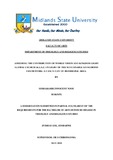Please use this identifier to cite or link to this item:
https://cris.library.msu.ac.zw//handle/11408/4024| Title: | Assessing the contribution of World Vision and Kingdom Light Global Church (K.L.G.C) in light of sustainable livelihood framework : a case study of Beitbridge area | Authors: | Ndou, Simbarashe Innocent | Keywords: | World Vision Kingdom Light Global Church sustainable livelihood |
Issue Date: | May-2018 | Publisher: | Midlands State University | Abstract: | This dissertation is an assessment of the effectiveness of the poverty alleviation strategies implemented by the World Vision and KLGC in the Tongwe area. The research was generally motivated by the individual concerns which have also influenced the focus of the project topic, the research problem as well as the area of study which is home to the writer. The central factor that has affected the writing of this academic paper was the ever growing need inside the Tongwe rural areas in Beitbridge regardless of the presence of the NGOs and church’s contributions towards poverty eradication. Such a large number of variables such as the absence of good infrastructure like roads, high level of illiteracy because of the insufficiency of schools, lack of viable wellbeing institutions (clinics and hospitals) in the surrounding areas, the absence of clean water as well as the high rate of unemployment in Zimbabwe which automatically inflict Tongwe areas. Tongwe is invested with a pool of domesticated animals which makes Matabeleland the backbone of cattle yet its people comprise the extensive level of the poorest in Zimbabwe. From the year 2000, the area has been graced by a large number of NGOs including the World Vision, churches like the KLGC and some independent well-wishers specialising in different programmes in different areas ranging from education, agriculture, food and non-food aid, health, conservation and advocacy. What matters most is that regardless of the growing number of establishments working towards the elimination of neediness, destitution is as yet escalating and widening day by day mostly with the deteriorating and bleeding country’s economic status. From the wholeness of the exploration, results show that the majority of the projects implemented concentrated much on relief than practical social amenities or development aid which matches the Sustainable Livelihood Framework approach demands. In their pursuit towards poverty eradication and sustainable development, the two institutions utilized the ordinary relief idea trickle down approach than the bottom up approach which to a certain degree miss the mark on them to enter the test of time struggle in accordance with the SDGs supposed outcomes. Lastly but not least, through recommendations from the author, the two institutions are recommended to utilize a more participatory approach which is holistic in view of the SLF approach in addressing poverty in Tongwe. The World Vision at large and the church needs to monitor and assess their projects of some loopholes that were identified right from the literature review through to the last words of these projects. Above all, the two foundations’ initiative towards alleviating destitution needs to be evaluated so that they may address the genuine issues that are the root causes of poverty. | URI: | http://hdl.handle.net/11408/4024 |
| Appears in Collections: | Ba In Theology And Religious Studies Honours Degree |
Files in This Item:
| File | Description | Size | Format | |
|---|---|---|---|---|
| NDOU PRELIMINARY PRINTING REVISED VERSION.pdf | Full Text | 1.27 MB | Adobe PDF |  View/Open |
Page view(s)
106
checked on Apr 4, 2025
Download(s)
46
checked on Apr 4, 2025
Google ScholarTM
Check
Items in MSUIR are protected by copyright, with all rights reserved, unless otherwise indicated.



